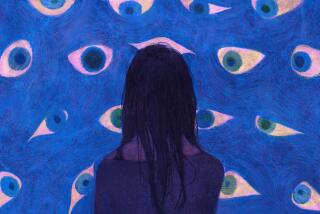When Eyes Fail, Let Tongue Lead the Way
- Share via
I can only imagine how hard it must be to get around without the sense of sight. I have never imagined, however, that my tongue could help guide the way.
But, according to an article in New Scientist magazine, engineers at the University of Wisconsin at Madison have dreamed up a contraption that would enable me to do just that. Does that mean you have to taste everything you encounter? Happily, no. Instead, images from a video camera are converted into electrical signals that send instructions to a grid of 144 electrodes held neatly on the surface of your tongue. Instructions that tell you to turn left. Turn right. Or proceed straight ahead. We called the intrepid researchers to learn more.
It’s early days for the device in question, says Kurt Kaczmarek, a member of the tongue-device research team. No one’s yet been let loose with it at a busy intersection. Plus, for now, you’d have a flat sort of wire coming out of your mouth and you’d have to lug around computer gear, too. (The researchers are working on miniaturizing the device.) But people who’ve tried navigating a maze on a computer find they can tell which way to turn quite nicely from the tingles on their tongues.
All very clever, but why--of all body parts--choose the tongue? It makes good sense, says Kaczmarek. The tongue--like the fingertip--is densely coated with sensory nerves so you can get a good spatial “picture” when it’s electrically tingled in different places. The fingertip, however, responds differently to the sensation when it’s sweaty or dry--which means it’s harder to make sure that the electrical signal is strong enough to feel, but not so strong that it makes you go “Yipe!”
“The tongue,” says Kaczmarek, “is largely immune to that problem because it is always wet.”
A Full Calendar
Did you know that this month is Rosacea Awareness Month? If you missed that fact, you’re excused--since it’s also Mental Retardation Awareness Month, National Chronic Fatigue Syndrome Awareness Month, National Collision Awareness Month, National Colorectal Cancer Awareness Month, National Kidney Month, National Nutrition Month, Poison Prevention Awareness Month, Workplace Eye Health and Safety Month--and also the month that houses Save Your Vision Week, Pulmonary Rehabilitation Week, National Sleep Awareness Week, National Inhalants & Poisons Awareness Week--and who can keep all that straight? (FYI: March is a slow month for health awareness events.)
But Rosacea Awareness Month, unlike all the others, helps quash a vicious stereotype: that Irish folks like to imbibe. Rosacea, known as the “curse of the Celts,” is a mysterious skin condition in which the face flushes red in patches. Though it can be triggered by wind, sun, spicy food or partaking of the demon drink, it crops up without such triggers.
Why “the curse of the Celts”? Because Irish people seem to be more prone to it. The National Rosacea Society (https://www.rosacea.org), for instance, found that 39% of the rosacea sufferers it polled had some Irish ancestry. By census data, only 16% of U.S. citizens are of Irish heritage.
“The red noses and rosy cheeks often seen at festive Irish gatherings are likely to be caused by rosacea, rather than too much ale,” insists rosacea expert Dr. Frank Powell of Mater Misericordiae Hospital in Dublin, Ireland. “It’s not blarney to say that a predisposition to rosacea may contribute to the false stereotype of the Irish as over-imbibers.”
In the spirit of contracting every ailment I write about, I’m now wondering if I too have rosacea; my face does get kind of red in patches (plus my mom swears blind we are descended from the royal kings of Munster, an ancient Irish province). If so, I’d better find out, because rosacea--if untreated--can proceed from the redness stage to a bumps-and-pimples phase to a bulbous-nose phase as nose tissue builds up.
Comedian W.C. Fields had a notably sized nose that was caused by his rosacea. And Bill Clinton has rosacea, too--as did the painter Rembrandt (if one can really diagnose from self-portraits), though their noses aren’t quite so notable. And I’d write more, but I note that it’s Workplace Eye Health and Safety Month (and we just had Save Your Vision Week), so I’m going to set a good example: Stop staring at the computer--and go stare at my nose in the mirror instead.
*
If you have an idea for a Booster Shots topic, write or e-mail Rosie Mestel at the Los Angeles Times, 202 W. 1st St., Los Angeles, CA 90012, rosie.mestel@latimes.com.




